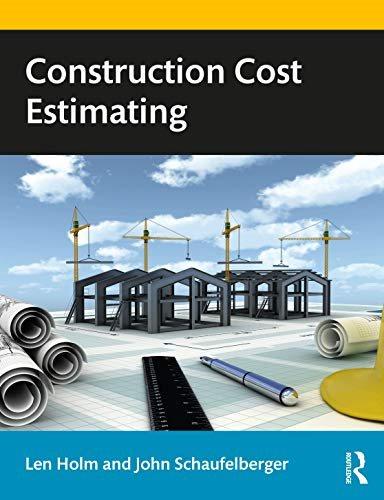Sixteen boxed-in ethical questions and scenarios were raised in this chapter. Prepare answers for each either as
Question:
Sixteen boxed-in ethical questions and scenarios were raised in this chapter. Prepare answers for each either as topics to debate in the classroom or as homework assignments to be turned in.
Ethics Questions and Scenarios:
Question 1:
Should a GC partner with a subcontractor and agree to only work together in pursuing a project? Will other subcontractors still bid to the GC, and if their prices are more cost-competitive, should the GC use them and ignore their informal partnership?
Question 2:
Would it be ethical for a GC and architect to have pre-bid clarification questions, just between those two firms, and not have the results documented in bid addenda available to all contractors? Would your answer change if this were a bid or negotiated project?
Question 3:
Is it ethical for a GC to market the project owner or architect pre-bid?
Question 4:
General contractors and subcontractors discover many inconsistencies and errors in the bid documents when preparing a detailed estimate. Should they hold back their questions until post-bid or bring them up during the bid cycle?
Question 5:
Some contractors ask many questions during the pre-bid meeting. Some contractors will not ask any questions until after the bid is awarded. Other contractors will pull the owner or architect aside during the pre-bid walk-through and ask questions one-on-one. What are the advantages and disadvantages of each of these scenarios, and are these strategies ethical?
Question 6:
Is it fair for an owner and their design team to issue large addenda the day before or even the day of a bid and expect that the GC has “informed all bidding subcontractors and suppliers” (or similar language typically included in the addendum)?
Question 7:
Most contractors will diligently schedule their estimating process. Most contractors would prefer to get the bid turned in and either proceed with the project or move on to the next opportunity. But there is always one firm that cannot seem to get organized and will ask for a bid extension. Should project owners allow this?
Question 8:
A concrete pipe supplier contacted a utility contractor who was preparing a bid for a major sewer project and offered discounted prices if the contractor purchased the needed pipe from the supplier. Was the supplier’s action ethical?
Question 9:
The site work for the construction of a medical clinic was unit priced. During review of the contract drawings, the estimator determined that the quantity shown on the unit price bid sheet for asphalt pavement was considerably less than what would be required for completing the project. The estimator decided not to notify the project owner and to inflate the unit price for the asphalt bid item because of the anticipated overrun. Was the estimator’s action ethical?
Question 10:
Should a GC communicate with a potential owner on bid day or, vice versa, should the owner communicate with the GC? What might some of these communications entail?
Question 11:
A reverse bid action is where GCs post their bids electronically with the project owner for all competitors to see pricing simultaneously. Contractors then raise or lower their prices not necessarily on the expected cost of the work but to beat the competition. Is this fair?
Question 12:
Do subcontractors bid the same price to all of the GCs? Do they give some preferential bids? Why would they do this? What risks are the subcontractors taking? How does the GC respond if they discover that they did not receive the same bid from a subcontractor as did their competitor GCs?
Question 13:
Is it ethical to use late subcontractor bids (a) on a public project, (b) on a private project, and/or (c) if the GC did not receive a valid bid in that category and used its own plug number?
Question 14:
Is it ethical for a private project owner to utilize a late GC bid? Would your answer range if it was a public or private bid opening? Would your answer range if you were the low bidder at (a) bid time or, conversely, (b) post-bid time?
Question 15:
Is it ethical on a private project for a GC to communicate with the project owner post-bid to find out how their price looks and/or inquire whether there is anything else the project owner needs?
Question 16:
Some private owners request voluntary VE proposals to be submitted with GC bids. THere is a strategy from the GC’s perspective whether they respond with much detail on this open request. Some owners may then collect all of the VE proposals, share them with all of the GCs, and ask for new pricing. This is obviously an example of a reverse bid auction as well. How should GCs respond to this request?
Step by Step Answer:

Construction Cost Estimating
ISBN: 9780367902681
1st Edition
Authors: John E. Schaufelberger, Len Holm





